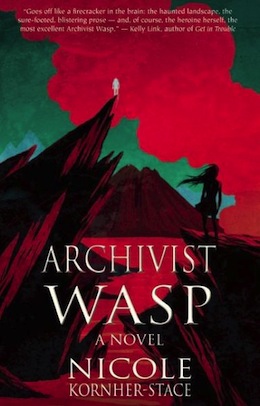This book. This book. In the past few years, there’ve been a handful of books I count it a privilege to have read—a handful of books with which I fell instantly and deeply in love. It’s a short list: Ann Leckie’s Ancillary Justice and Ancillary Sword; Katherine Addison’s The Goblin Emperor; Elizabeth Bear’s Karen Memory. I might spot you one or two others, depending on the day, but these are the ones that hit me right on an emotional level, where pleasure in the quality of writing combines with a straight shot to my narrative hindbrain: this is our stuff! This is OUR THING!
Nicole Kornher-Stace’s Archivist Wasp has added itself to that list. I didn’t expect it to: at a brief glance, it sounded a little too peculiar. But then I came across Amal El-Mohtar and Ana Grilo (of The Booksmugglers) discussing its merits on Twitter—and when people like that recommend a thing, I try to take notice.
Wasp is the Archivist. Her job is simple: hunt ghosts in a world that teems with them, long after a technological apocalypse. And, if she can, find out from them about the apocalypse that broke the world. But ghosts don’t speak.
As Archivist, Wasp is an outcast, marked from birth by the goddess Catchkeep to do her work. Or so Catchkeep’s priest has always said, at least. In order to become Archivist, Wasp killed the Archivist before her. And every year, she has to fight—and kill—to keep her role, against three other girls marked as she is. (Archivist Wasp opens with the latest of these fights and its immediate aftermath, and Kornher-Stace’s skill and command of voice is immediately apparent.)
Wasp’s life is solitary and brutal, and looks set to be short. At least, until she encounters a ghost that does speak. A ghost who offers her a bargain that might help her escape. A ghost who wants her help. Accepting his bargain will take her on a journey to the underworld in search of the ghost of the partner he thinks he betrayed. Maybe Wasp will make it back. Maybe she won’t. Soon she becomes invested in the search for the ghost of Catherine “Kit” Foster for its own sake. For the chance to do something of her own choice.
Katabasis: a going down, a descent to the underworld. Most stories of katabasis end badly. But Wasp’s katabasis is at the same time her coming-of-age, her discovery of who she is when she has the opportunity to make her own choices. And for both Wasp and the ghost—who has forgotten his own name, as Wasp has almost forgotten who she was before she was Wasp — the going-down is also a going-back: as the ghost leads Wasp through the underworld, Wasp enters the memories of Kit Foster, and sees part of their lives—Foster’s and the ghost’s—as supersoldiers created for war, before the apocalypse that left the world as Wasp knows it.

(I feel it is important to mention that Archivist Wasp eschews romantic cliché entirely. There is no romance. This makes the novel all the more powerful.)
Archivist Wasp has great strength of voice. (The strength of voice and the mix of magic and technology in the worldbuilding put me in mind of another novel from the last couple of years, in fact. If you enjoyed Karina Sumner-Smith’s Radiant, you will love this. And vice versa, I can all but guarantee it.) It has really compelling characters: Wasp, prickly and desperate, fierce and bitter but still with a core of compassion; the ghost; Foster (oh, heavens, Foster). The other girls, some of whom are never named. (The ending. Oh, the ending.) And it brings what should be disparate parts together into a startling unity, an imaginative whole that rips a small place open inside me and fills it up with feelings.
In short: ARCHIVIST WASP. YES. READ IT. YES.
It really is very good.
Liz Bourke is a cranky person who reads books. Her blog. Her Twitter.











I was totally entranced by this book. Terrific prose, a weird and original world, and the awesomeness of Wasp herself–I fell for it pretty fast.
Well. I’ll have to read this one, I guess. :)
Definitely an interesting novel with stellar world building.
I felt there was an implied romance between Nameless and Kit, implied to the point where they didn’t recognize it themselves.
Katharine @1:
Isn’t it great? Isn’t it magnificent? I mean, WASP.
Stefan @2:
Oh, you must. You absolutely must.
MByerly @3:
I didn’t read it that way: if anything, siblings. But not everyone will read things the same way. *g*
I read the free sample* and I wasn’t grabbed. If she’s the only person who can save the world, why is the priest such a bastard? Why won’t anybody help her or let her sleep in their house? Why can’t she have time to heal? If her life is so awful, why are all those upstarts trying to steal her job? If the priest doesn’t respect her, why does she assume the Archivist notes are sacrosanct? It read to me like a particularly whumpish Buffy AU.
*btw, what is wrong with e-publishers? A 20-page sample that has 12 pages of actual book in it is not very helpful.
@5 TexAnne, I feel some of your questions are answered in the full book.
But can someone explain Foster’s plan to me? I have been wondering for ages what she was trying to accomplish, and I can’t figure any of it out. It seems obvious that if she just wanted out, she and the ghost could have disappeared. So what more was she trying to do by staying after the hostage “rescue”?